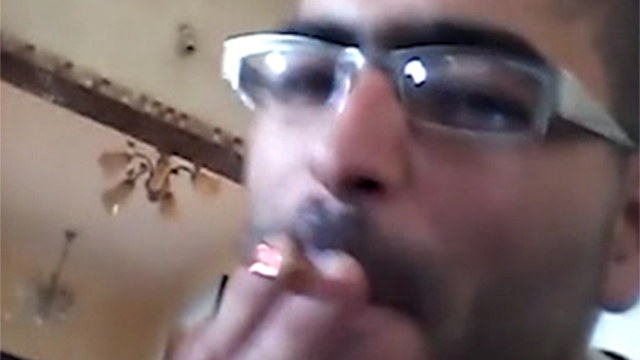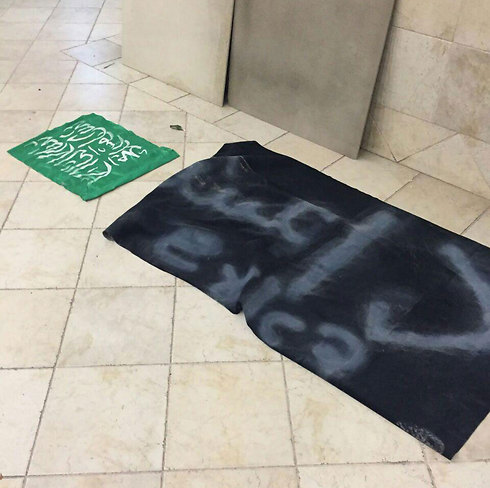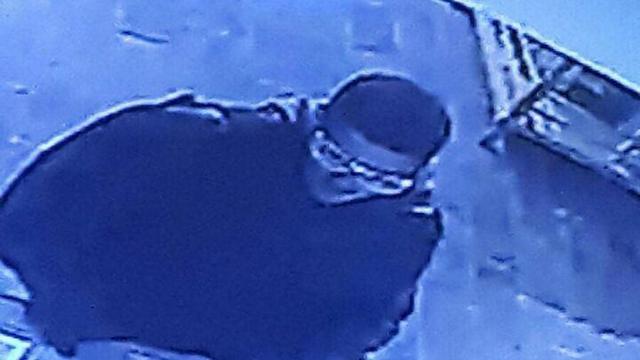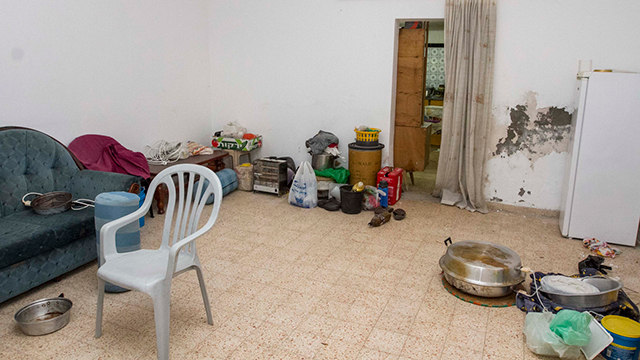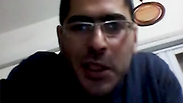
Tel Aviv terrorist's videos: Drugs, religion, and Obama
Footage found on Nashat Melhem's phone shows him smoking hashish and exhibiting bizarre behavior; Shin Bet releases details of investigation.
The Shin Bet on Wednesday released the full details of its investigation into Nashat Melhem, a terrorist who murdered three people in Tel Aviv this month, revealing recreational drug use, support for ISIS, and a bizarre message calling on US President Barack Obama to convert to Islam.
Videos of the terrorist, which he filmed himself, were found on his cell phone that was lost in Ramat Aviv on the day of the shootings. In the video, Melhem talks about smoking hashish and marijuana, drinking alcohol, and "snorting up."
Also found on the phone was evidence that the terrorist had viewed religious material designed as mental preparation for a terror attack. Melhem also spoke of his hatred of "enemies of Islam" in his videos, using phrases similar to those used by ISIS. He also detailed his hatred for Russians.
According to the indictments, Melhem decided to commit a terror attack somewhere crowded in Tel Aviv, "with the purpose of causing as many Israeli civilian deaths as possible, and with the intention of helping the enemy in its war against Israel, including the ISIS organization."
On January 1 at around 2:40pm, Melhem arrived at Dizengoff Street with a Koran and a rifle. Next to the HaSimta pub, Melhem fired at least 22 bullets, killing Alon Bakal and Shimon Ruimi and wounding several others.
Melhem fled, leaving the Koran at the scene. He got into a passing taxi driven by Amin Shaban, who drove him northward. Next to the Mandarin Hotel, still in Tel Aviv, Melhem shot Shaban dead when he began suspecting the driver would turn him in to the police.
The terrorist, encountering difficulties with the taxi, abandoned it on Namir Road and reached Ramat Aviv, an area with which he was familiar. He hung a piece of cloth bearing the word "Daesh" (another name for ISIS) from the roof of a building as well as another with the phrase "there is no God but Allah and Mohammed is the messenger of Allah" in Arabic. He then continued on to the Wadi Ara area on public transportation and then hid in the town of Arara.
Spotted on the bus north
According to a report on Israel Radio on Wednesday, two passengers who were on a bus going north from Tel Aviv at around 3:30pm on the day of the attack saw a man with blood stains on his clothes, who kept his backpack close. They later realized the man was Nashat Melhem on his way out of Tel Aviv.
The two sisters approached the bus driver and shared their suspicions with him, but the driver calmed them down by telling them the suspicious man was about to get off the bus anyway.
The two girls heard the driver tell Melhem "from here (this bus stop) you can go to Wadi Ara, get off here."
At around 8pm, after seeing Melhem's photo on the news and realizing he was the man sitting next to them on the bus, the two shared their suspicions with their employer, and he called the police's emergency call center. The policeman on the other side of the line told the employer he will hear back from the police, and when no call back came by midnight, the employer called the police again.
The emergency call center told the employer to call the police's non-emergency call center, and after waiting half an hour on the line, he gave up and went to bed.
On Sunday morning, when one of the sisters saw no one had returned their calls, she called again, but the police once again paid her no heed and told her to call the non-emergency call center.
On the Monday following the attack, when the second sister called a fourth time, she was told "if no one got back to you by now - it means it's not relevant."
The police said in response: "The call in question was received in the police call center hours after the attack and after the girls got off the bus, and this was one of thousands of calls to the Israel Police call center handled based on several different parameters, including the nature of the information given, the level of relevancy at the time of the call, and more.
"The call was checked and it was found that despite the unclear nature of the call, actions were taken like locating the bus driver and questioning relevant witnesses, as has been done for many other calls in order to strengthen our understanding of the situation."
From a shed to an abandoned apartment
Upon arriving in Wadi Ara, Melhem first hid in a shed belonging to one of those indicted. He moved to another house, where he was eventually found, on the second day. Melhem threatened the owner of the shed and said he would hurt his wife and family if anyone discovered that they had met. Another suspect supplied food and a cell phone, and the third suspect brought him two packs of cigarettes. One suspect even supplied Melhem with drugs. Two of the accused are relatives, while the third met Melhem at a convenience store where he works.
In the week between the attack and Melhem's capture, the terrorist hid in several spots in Arara, including a shipping container owned by a relative. Based on investigators' current knowledge, Melhem hid there independently, without his family's knowledge. He also hid in a closet in a relative's home – a relative who was an essential accomplice and knew he was involved in the Tel Aviv shooting. This relative later helped Melhem set up in an abandoned home that belonged to an elderly woman – which is where Melhem was ultimately located by security forces.
The investigation ultimately showed that Melhem planned and committed the terror attack on his own, without anyone else's involvement.
The Shin Bet investigation showed that a limited number of Melhem's associates were aware that he was in Arara, and some helped provide him with food and other necessities. The security service also found that Melhem purchased drugs immediately upon his return to Arara. He also asked accomplices for additional ammunition, apparently in order to commit further attacks.
Omri Efraim and Eli Senyor contributed to this report.











